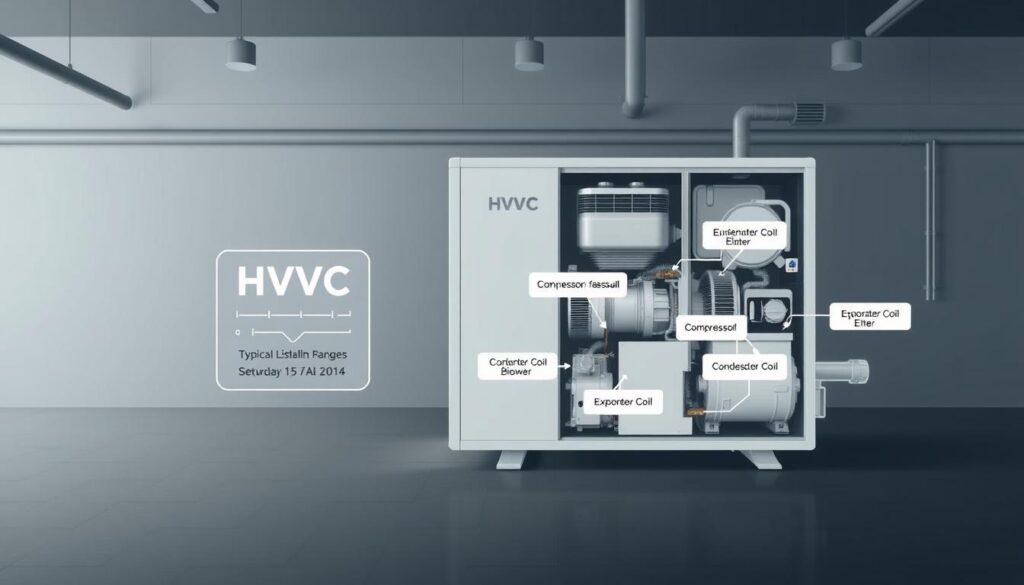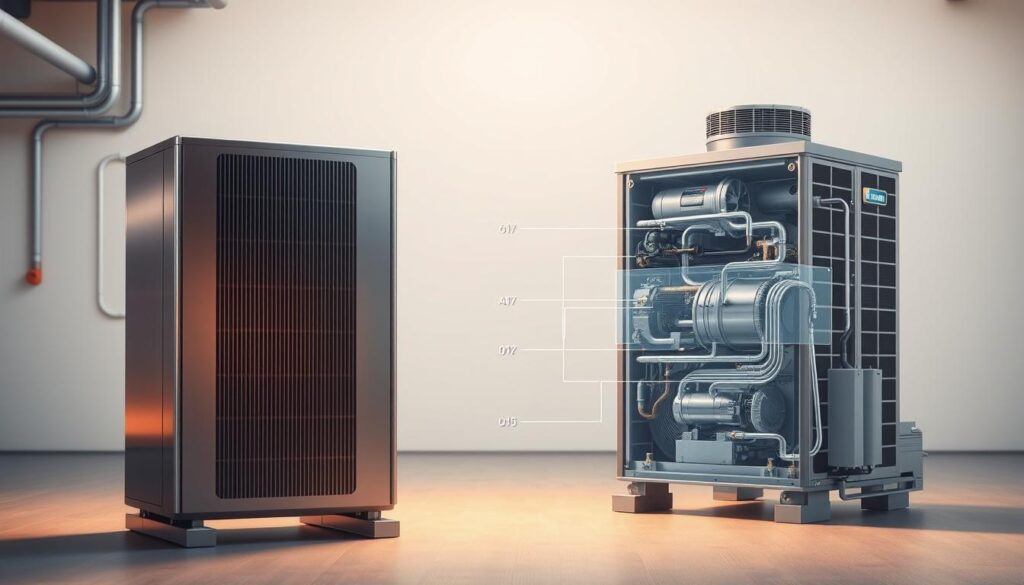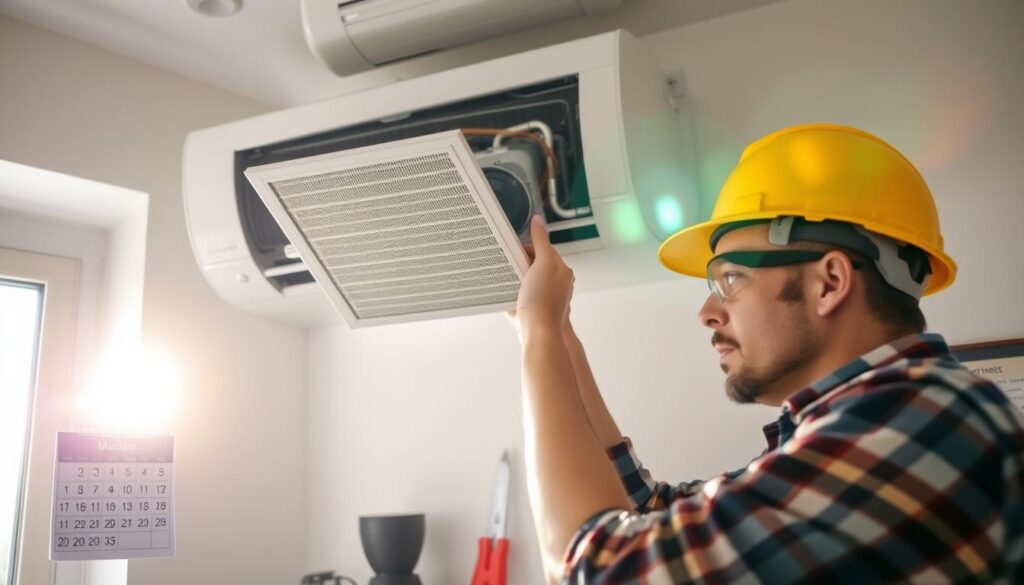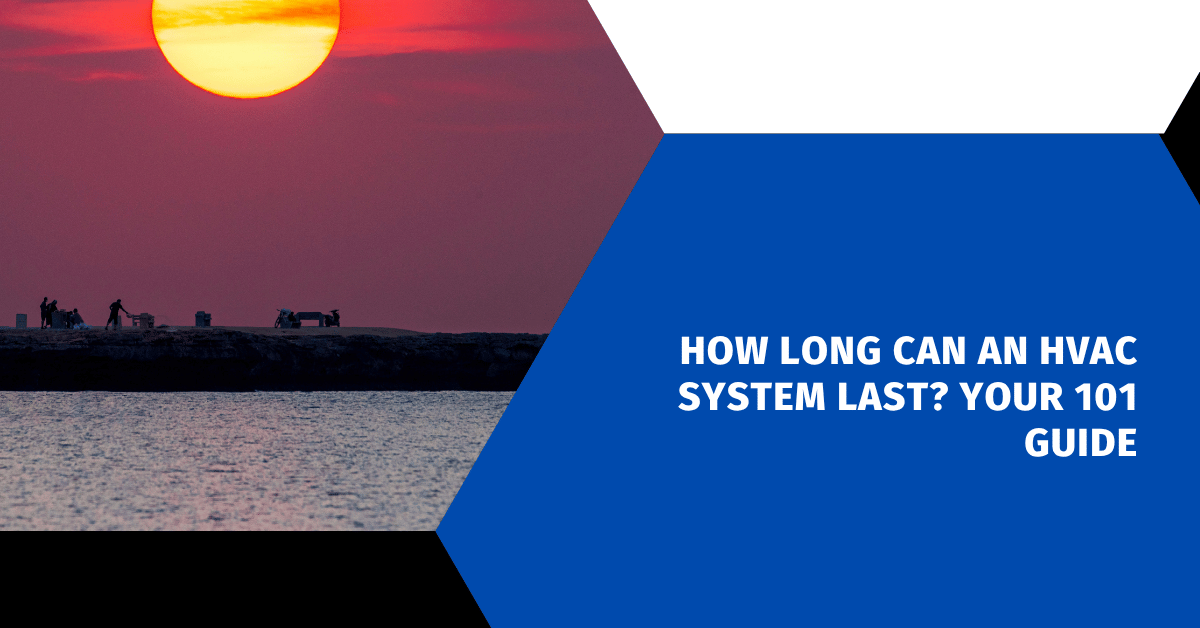Affiliate Disclosure
HVAC Guide Guys is a participant in the Amazon Services LLC Associates Program, an affiliate advertising program designed to provide a means for sites to earn advertising fees by advertising and linking to Amazon.
Ever thought about How Long Can an HVAC System Last? The lifespan of an HVAC system is key for homeowners who want reliable temperature control and to save on home maintenance.

HVAC systems are built to keep your home comfy for 15 to 25 years. Knowing how long your HVAC system might last helps you make smart choices about upkeep, repairs, and when to replace it.
Many things affect how long an HVAC system lasts. Things like how well you maintain it and the environment around it play big roles. Your system’s lifespan isn’t just luck; it’s the result of careful care and attention.
Key Takeaways
- HVAC systems typically last 15 to 25 years
- Proper maintenance significantly extends system life
- Environmental factors impact HVAC durability
- Regular servicing prevents premature system failure
- Age and performance are critical replacement indicators
Table of Contents
Understanding HVAC System Lifespans
Your HVAC system is key to your home’s comfort. Its lifespan depends on several factors. Knowing what affects your system’s durability is important.
System Types and Their Expected Lifespans
Different HVAC systems have unique traits that affect their lifespan. Here’s a look at typical lifespans:
- Central Air Conditioning Units: 12-17 years
- Heat Pumps: 10-16 years
- Furnaces: 15-20 years
- Geothermal Heat Pumps: 25-30 years
- Solar HVAC Systems: 25-30 years
Factors Affecting HVAC Longevity
Several elements impact your HVAC system’s lifespan. Performance and longevity depend on:
Explore Our HVAC Shop
Looking for top-rated HVAC tools, parts, and accessories? Visit our shop and find the perfect solution for your needs.
Visit the Shop- Maintenance frequency: Regular professional servicing
- Usage patterns and intensity
- Local climate conditions
- Installation quality
- Home insulation effectiveness
Maximizing Your System’s Performance
Proactive maintenance can extend your HVAC system’s life. Simple steps like changing air filters and scheduling annual inspections can prevent early failure.
Investing in maintenance today can save substantial replacement costs tomorrow.
The Expected Lifespan of Furnaces and Boilers
Knowing how long furnaces and boilers last is key for homeowners. These systems are big investments in home comfort. They can work well for 15 to 30 years with the right care.
Heating systems vary in how long they last. Gas furnaces usually last 12-15 years. Electric furnaces can go up to 15-20 years. Boilers, on average, last 15-20 years. But some cast iron models can last over 30 years.
- Gas furnaces: 12-15 years average lifespan
- Electric furnaces: 15-20 years operational period
- Residential gas boilers: 15-20 years typical duration
- Cast iron boilers: Possible over 30 years of service
Keeping your heating system running well depends on a few things. Regular maintenance is key. Getting your system checked every year can spot problems early.
Here are some tips to make your furnace or boiler last longer:
- Get a yearly check-up from a pro
- Change filters often
- Keep an eye on how your system is doing
- Fix problems quickly
Environmental factors like humidity and water quality matter too. Hard water, for example, can cause sediment buildup. This can make your system less efficient and shorter-lived.
Proactive maintenance is always more cost-effective than reactive replacement.
Air Conditioning Units: Typical Duration and Performance
Keeping your home cool is key, and knowing about air conditioning units is important. Your AC system is a big investment. Understanding its lifespan helps you plan for the future.
Air conditioning systems usually work well for 15 to 20 years with regular care. The efficiency of your hvac system over time depends on several important factors. Homeowners should know about these.
Central Air Conditioning Systems
Central air conditioning units cool your whole home. They last 15 to 20 years with good maintenance. As your unit gets older, you’ll notice signs of aging around the 10-year mark.
- Average lifespan: 15-20 years
- Performance peak: First 10 years
- Efficiency decline: Gradual after initial decade
Window Units and Mini-Split Systems
Smaller cooling solutions have different lifespans. Window units usually last 5-8 years. Mini-split systems can last 15-20 years with proper care.
Efficiency Over Time
Your air conditioning unit’s efficiency will decrease as it gets older. Several factors affect its performance:
- How often you use it
- The climate it’s in
- How well it’s maintained
- How it was installed
“Regular maintenance can significantly extend your AC unit’s life and maintain its efficiency,” says HVAC expert Robert Martinez.
To keep your system running well, get annual professional checks. Also, change filters every 1-3 months. These actions can help your hvac system stay efficient longer and delay signs of aging.
Heat Pump Duration and Efficiency Insights

Knowing how long a heat pump lasts is key for homeowners. It helps them get the most out of their HVAC system and extend its life. Heat pumps usually last between 10 to 15 years, providing both heat and cool air.
The life of your heat pump depends on a few important things:
- Regular maintenance
- Installation quality
- Local climate conditions
- How often you use it
To keep your HVAC system running well for longer, follow these maintenance tips:
- Get a professional to check it every year
- Change filters every 1-3 months
- Clean the outside unit often
- Keep an eye on how well it’s working
| Maintenance Activity | Frequency | Impact on Lifespan |
|---|---|---|
| Professional Inspection | Annually | Extends life by 20-30% |
| Filter Replacement | Every 1-3 months | Prevents efficiency loss |
| Coil Cleaning | Bi-annually | Maintains peak performance |
Pro tip: Invest in preventative maintenance to ensure your heat pump operates at peak efficiency and maximize its lifespan.
“A well-maintained heat pump is an investment in long-term home comfort and energy efficiency.” – HVAC Experts
Climate is a big factor in how well a heat pump works. Units in milder temperatures usually last longer than those in very hot or cold places. Knowing this helps you take better care of your HVAC system and decide when it might need to be replaced.
Explore Our HVAC Shop
Looking for top-rated HVAC tools, parts, and accessories? Visit our shop and find the perfect solution for your needs.
Visit the ShopSigns Your HVAC System Needs Replacement
Knowing when to replace your HVAC system can prevent unexpected breakdowns and expensive repairs. A reliable heating and cooling system is key to your home’s comfort. Spotting the signs of an aging HVAC system is essential for keeping it running well.
Several key indicators suggest it might be time to consider a new HVAC system:
Physical Warning Signs
- Visible rust or corrosion on the unit
- Loud or unusual noises during operation
- Persistent strange odors when the system runs
- Excessive dust or visible wear and tear
Performance Indicators
Your HVAC system might be struggling if you experience:
- Inconsistent temperatures throughout your home
- Reduced airflow from vents
- Frequent cycling on and off
- Poor air quality or increased humidity
Cost-Related Signals
Financial indicators can reveal when replacement makes sense:
- Rising utility bills suggesting decreased efficiency
- Repair costs approaching 50% of a new system’s price
- Multiple repairs within a short time frame
- System is over 10-15 years old
By paying attention to these warning signs, you can proactively manage your HVAC system’s health. This helps avoid unexpected failures.
Explore Our HVAC Shop
Looking for top-rated HVAC tools, parts, and accessories? Visit our shop and find the perfect solution for your needs.
Visit the ShopHow Long Can an HVAC System Last with Proper Maintenance

Keeping your HVAC system running longer is not just a dream. It’s a smart move. Regular upkeep can make your heating and cooling last longer. This can save you a lot of money on new systems.
Having a good maintenance plan is key to keeping your system in top shape. Most HVAC systems can last 15 to 20 years. But, with the right care, they can last even longer.
- Clean or replace air filters every 30-90 days
- Schedule professional inspections twice annually
- Keep outdoor units clear of debris
- Maintain consistent system cleaning
Your efforts to keep your system in good shape really pay off. Smart homeowners know that taking care of their systems early on saves a lot of money. Experts can spot problems before they cost a lot. This keeps your HVAC running smoothly.
Important maintenance steps include:
- Annual professional tune-ups
- Regular filter replacements
- Keeping indoor and outdoor units clean
- Checking refrigerant levels
- Inspecting electrical connections
By sticking to regular maintenance, you can make your HVAC system last longer. This cuts down on energy costs and prevents sudden breakdowns.
Environmental Factors Affecting HVAC Longevity
Your HVAC system’s lifespan is tied to its environment. Factors affecting HVAC longevity include more than just maintenance. They also involve geographic and climatic conditions that can greatly affect system performance and durability.
Different environments pose unique challenges for HVAC systems. Coastal areas, for example, are risky due to salt and high humidity. In these places, HVAC systems may last only 7-12 years, much less than the usual 15-20 years.
Climate Challenges for HVAC Systems
Your local climate is key to HVAC system longevity. Extreme conditions can speed up wear and tear:
- Coastal areas with high salt content in the air
- Regions with extreme temperature fluctuations
- Areas with high humidity levels
- Locations with significant air pollution
Geographic Location Impact
Different geographic zones have unique environmental stressors:
- Desert Regions: Intense heat causes increased system strain
- Humid Subtropical Areas: Moisture accelerates component corrosion
- Cold Northern Climates: Extreme winter conditions challenge system performance
Knowing these environmental factors can help you protect and maintain your HVAC system. This can extend its life beyond what’s expected.
Explore Our HVAC Shop
Looking for top-rated HVAC tools, parts, and accessories? Visit our shop and find the perfect solution for your needs.
Visit the ShopCost Considerations: Repair vs. Replace
Choosing when to replace your HVAC system can be tough. It’s about comparing repair costs to replacing the whole system. Knowing the costs helps you invest wisely in your home’s comfort and energy use.
Experts say to use the “$5,000 rule” to decide. This means multiplying the system’s age by repair costs. If it’s over $5,000, replacing might save you money.
- Repair if the total is less than $5,000
- Consider replacement if the total exceeds $5,000
When thinking about replacing your HVAC, look at these financial points:
| System Age | Repair Cost Recommendation |
|---|---|
| Under 10 years | Typically recommend repairs |
| 10-15 years | Evaluate case-by-case |
| Over 15 years | Strong case for replacement |
Energy efficiency is key in your choice. Replacing an old SEER 9 air conditioner with a SEER 14 can cut energy costs by over 35%. New systems save money over time by using less energy and working better.
Other things to think about include how often repairs are needed, how well the system works, and tax credits for energy-saving upgrades. If your system needs many repairs in three years, replacing it might be cheaper.
Maximizing Your HVAC System’s Lifespan
Keeping your HVAC system running well needs careful maintenance and smart habits. It’s a big investment in your home. So, taking good care of it is key for its best performance and long life.
Having a regular hvac maintenance schedule can really help. Experts say there are a few important steps to make your HVAC last longer:
- Replace air filters every 1-3 months
- Schedule professional annual inspections
- Keep outdoor units clean and debris-free
- Maintain consistent thermostat settings
- Ensure proper home insulation
Regular upkeep can add 5-10 years to your HVAC system’s life. Experts can spot problems early. This saves you from expensive fixes and sudden breakdowns.
| Maintenance Activity | Frequency | Potential Benefit |
|---|---|---|
| Air Filter Replacement | Every 1-3 months | Improved air quality, system efficiency |
| Professional Inspection | Annually | Early problem detection |
| Thermostat Calibration | Biannually | Energy savings up to 30% |
By spending a little time and effort on maintenance, you can save a lot of money. You’ll also keep your home comfortable all the time.
Proactive maintenance is always more cost-effective than reactive repairs.
Most HVAC systems can last 15-20 years with the right care. Your regular maintenance efforts decide if your system will reach its full lifespan.
Explore Our HVAC Shop
Looking for top-rated HVAC tools, parts, and accessories? Visit our shop and find the perfect solution for your needs.
Visit the ShopModern HVAC Technologies and Improved Durability
The world of HVAC technology has changed a lot. Now, homeowners have new ways to make their HVAC systems last longer. New innovations are changing how we think about keeping our homes cool and warm.
Today’s HVAC systems are a big step up in performance and life span. Companies have made new technologies that make systems work better for longer. These systems are smarter and more durable.
Energy Efficiency Advances
Modern HVAC tech brings big gains in saving energy:
- Electric heat pumps can cut energy use by up to 50%
- New systems use only a third of the energy old ones do
- Smart sensors adjust temperature and airflow on their own
Smart System Integration
Smart HVAC systems now offer amazing control and monitoring. These smart systems can predict when you need maintenance, track how well they’re working, and adjust settings for the best efficiency.
Modern HVAC tech brings many benefits:
- It lets you track performance in real-time
- You can manage your system from your phone
- It sends alerts for when you need maintenance
- It shows how much energy you’re using
By choosing these advanced technologies, you can make your system last longer and work better. Plus, you’ll save money on energy costs over time.
Conclusion
Knowing how long an HVAC system lasts is key for homeowners who want comfort without breaking the bank. These systems usually last between 10 to 20 years. This depends on how well you maintain it, how often you use it, and your environment.
Regular upkeep is essential to make your HVAC last longer. Simple steps like changing filters and getting yearly checks from pros can help. If fixing your system costs almost as much as a new one, it’s time to think about getting a newer, more efficient model.
Managing your HVAC should focus on performance, efficiency, and cost. Watch for signs like higher energy bills, less cooling, and constant repairs. By knowing your system’s needs and making smart choices, you can keep your home comfortable while saving money in the long run.
Knowledge is your greatest ally when it comes to your HVAC’s lifespan. Invest in expert advice, keep up with new tech, and focus on preventing problems. This way, you’ll get the most out of your home’s heating and cooling systems.

